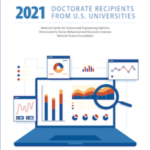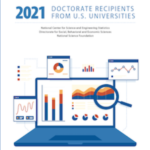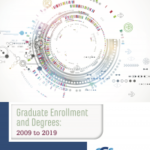 All Entries in the "Degree Attainments" Category
All Entries in the "Degree Attainments" Category

The Gender Gap in Employment and Salaries for Doctoral Recipients
For 2023 doctoral recipients who had a job offer, 41.5 percent of women had accepted positions in the academic arena. In 2008, 58.2 percent of women who earned doctorates had secured an academic appointment by the time they were awarded their doctoral degree.

Universities That Awarded More Than 300 Doctorates to Women From 2019-2023
A total of 17 universities awarded more than 300 doctorates to women during the five-year span from 2019 to 2023. Of these, women earned a majority of the doctorates at only three institutions: Walden University, the University of Minnesota, and the University of Georgia.

The Large Gender Gap in Doctoral Awards in Specific Disciplines
While women earned 47 percent of all doctorates awarded by universities in the United States, there was a huge gender gap in many specific disciplines.

Women Continue to Earn More Than Half of All Doctorates Awarded to U.S. Citizens
If we exclude data for foreign students and restrict the data to U.S. citizens and permanent residents of this country, we find that 18,893 women earned doctorates in 2023. This was 53.1 percent of all doctoral recipients among U.S. citizens and permanent residents.

Georgetown University Examines Gender Gap in Income Among American Graduate Degree Holders
Despite representing over half of all graduate degree holders in the United States, women with graduate degrees earn, on average, $34,000 less per year than their male peers.

Report Reveals Women More Likely Than Men to Complete All Levels of Postsecondary Education
In analyzing data of postsecondary education among students who were in ninth-grade in 2009, the study found women were more likely than men to complete their postsecondary education at all levels.

The Gender Gap in the Time It Takes to Earn a Doctoral Degree
Men were far more likely than women to earn a doctorate before the age of 30. Some 43.2 percent of women earned their doctorate before the age of 30. For men, 46.8 percent of all doctoral degree recipients in 2022 were below the age of 30.

After Four Years of Decline, the Number of Women Earning Research Doctorates Was Up 10 Percent in 2022
The good news is tempered by the fact that in 2022 women earned only 32.7 percent of the doctorates in the physical sciences. In engineering, women earned 27.2 percent of the doctorates awarded in 2022 and in mathematics women earned just 22.7 of all doctorates awarded.

Gender Differences in Graduate Degree Awards
Data from the Council of Graduate Schools shows that women earned 33,784 master’s degrees in the 2021-22 academic year. This was 66.9 percent of all master’s degrees awarded. Women earned 43,027 doctoral degrees in the 2021-22 academic year. This was 54.5 percent of all doctoral degrees awarded.

The Gender Gap in Educational Attainment in the United States
There are about 5.5. million more women than men in the United States who are college educated. Women hold a large lead over men in master’s degree attainments. Men continue to hold a narrowing lead over women in professional degrees and doctorates.

Three Women Who Have Been Appointed to Dean Positions
Magda Hinojosa has been appointed dean of social sciences for the College of Liberal Arts and Sciences at Arizona State University. Dorothy E. Mosby will be the next dean of the faculty and vice president for academic affairs at Skidmore College in Saratoga Springs, New York, and Gayla Stoner will be the next dean of the College of Professional and Continuing Education at Creighton University in Omaha, Nebraska.

Ranking the States by the Percentage of Women Among Their Doctoral Degree Recipients
In 2021 California awarded the most doctorates to women of any other state. Only five states awarded more doctorates to women than men: Mississippi, Nevada, Hawaii, Minnesota, and Maine. Hawaii had the highest percentage of women among its doctoral degree recipients.

New Data on the Gender Gap in Bachelor’s and Advanced Degrees
The numbers show that nearly 30 million women in the United States have a bachelor’s degree but no graduate degree. Another 17,568,000 women hold a graduate or professional degree.

The Significant Gender Gap in College Graduation Rates
The statistics show that 64.5 percent of all students entering four-year colleges in 2015 seeking a bachelor’s degree had graduated within six years. Some 66.4 percent of all women had earned a degree within six years compared to 60.4 percent of men. Women graduated at a higher rate than men in all racial and ethnic groups.

The Number of American Women Earning Research Doctorates Drops for the Fourth Year in a Row
Data from the National Science Foundation shows that 16,441 American women earned doctorates in 2021. This was 51.9 percent of all doctoral recipients among U.S. citizens and permanent residents. Since 2017, the number of U.S. women earning doctorates is down by nearly 10 percent. But the number of U.S. men earning doctorates dropped at a slightly higher rate.

In 2020 There Were Large Gender Disparities in the Funding of Doctoral Education
Nearly 30 percent of all women who earned doctorates in 2020 took out loans to finance their doctoral studies. For men, 19.8 percent took out loans. The average graduate education debt for women was $30,966. Men who earned doctorates in 2020 had an average graduate student debt of $21,608.

The Wide Gender Gap in Doctoral Degree Awards in Specific Academic Disciplines
Women made up a small majority of all U.S. citizens or permanent residents who earned doctorates in 2020. But when we look at doctorate degree awards in specific disciplines, we find a continuing wide gender gap in many specific disciplines.

The Number of U.S. Women Earning Doctorates Dropped for the Third Year in a Row
In 2020, women earned 69.1 percent of all doctoral degrees awarded in education and 65.7 percent of all doctorates in the health sciences. In contrast, women earned only a third of the doctorates in the physical sciences. In engineering, women earned 24.8 percent of the doctorates awarded in 2020. In mathematics and computer science, women earned just under a quarter of all doctorates awarded in 2020.

Pew Research Center Report Documents Gender Gap in STEM Degree Attainment and Employment
Women now earn a majority of all undergraduate and advanced degrees. But they remain a small share of degree earners in fields like engineering and computer science – areas where they are significantly underrepresented in the workforce. And when women do find work in STEM fields they tend to earn less than men.

Gender Differences in the Age of Doctoral Degree Recipients in the United States
On average, women who earned doctorates were 31.9 years old when they received their doctoral degrees. For men, the average age was 31.3. But when we break the figures down by age group, we see more pronounced differences.

National Science Foundation Reports a Slight Drop in Doctoral Degree Attainments by Women
The National Science Foundation reports that in 2019, 17,994 American women earned doctorates at U.S. colleges and universities. From 2016 to 2018, more than 18,000 American women earned doctorates each year. Women earning doctoral degrees has increased 10.2 percent since 2010. For men the increase has been 13.1 percent.

How Well Do the Nation’s Women’s Colleges Succeed in Graduating Their Students?
Nationwide, at large colleges and universities, about 70 percent of all women who enter college graduate within six years from the same institution at which they initially enrolled. At many women’s colleges, students do even better. At Barnard College, Wellesley College, and Scripps College, the graduation rate is over 90 percent.

Which Sports Do the Best in Graduating Their Women Student Athletes?
The highest graduation rate for women’s sports was for fencing, where 87 percent of women athletes earned their degree. The graduation rates for women athletes in gymnastics, ice hockey, rowing, lacrosse, skiing, swimming, and water polo were over 80 percent.

The Nationwide Gender Gap in College Graduation Rates
For all students who enrolled in bachelor’s degree programs at NCAA Division I institutions in 2013, 67 percent earned their degrees by 2019. When we break the figures down by gender, we see that 70 percent of women earned their degrees within six years compared to 64 percent of men.

New Report Examines the Gender Gap in College Graduation Rates
For all students who enrolled in 2013, 62.3 percent of women earned a degree within six years. For all men who entered four-year colleges in 2013, only 56.2 percent had earned a degree by 2019.

Master’s Degrees Awarded in Many Disciplines Are Heavily Segregated by Gender
Women were 76.7 percent of all individuals who were awarded master’s degrees in educational fields and nearly 80 percent of all master’s degree recipients in health science fields. In contrast, women received only 27.3 percent of all master’s degrees in engineering and were just over a third of all recipients in mathematics and computer sciences.

Examining Degree Attainments at the Nation’s Women’s Colleges
In the 2017-18 academic year, women’s colleges in the United State awarded 534 associate’s degrees, 12,176 bachelor’s degrees, 6,123 master’s degrees, and 522 doctorates. All graduate degree programs (and some bachelor’s degree programs) at women’s colleges are open to men and women.

Wesleyan University’s Prison Education Program Graduates Seven Women
The Wesleyan Center for Prison Education began offering classes at the women’s prison in 2013. Since that time, the program has offered nearly 140 classes to more than 150 incarcerated students, according to the university.

For the First Time, Women Now Make Up a Majority of the College-Educated U.S. Workforce
Each year since the 1981-82 academic year, women have earned more bachelor’s degrees than men. By 2007, the number of women with a college degree surpassed the number of men with a college degree for the first time. In 2019, women now make up a majority of all workers who hold a college degree.

The Gender Gap in Educational Attainment in the United States
In 2018, 36,674,000 living men in the United States held a four-year college degree. This is 34.6 percent of all men over the age of 25. For women, 40,251,000 individuals held a four-year college degree. This was 35.3 percent of all women over the age of 25.

Academic Disciplines With Huge Gender Gaps in Doctoral Degree Awards
In 2017, women earned nearly 47 percent of all doctorates awarded by universities in the United States. But there are a significant number of disciplines where women earned less than one third of all doctorates. In contrast, there are a large number of fields in which women earned more than three quarters of all doctorates.

Ranking the States by the Percentage of Women Among Their Doctoral Degree Recipients
In Alaska, women earned 63.5 percent of all doctorates awarded in 2017. This was the highest percentage in the nation. In contrast, women earned only 30.9 percent of all doctorates awarded in South Dakota. Some 38 percent of all doctorates in the state of Utah and 38.6 percent of all doctorates earned in the state of Wyoming were earned by women in 2017.

U.S. Women Earn a Majority of All Doctoral Degree Awards But a Huge Gender Gap Persists in STEM Fields
In 2017, women earned less than a third of the doctorates in the physical sciences and less than a quarter of all doctorates in mathematics and computer science. In engineering, women earned 22.3 percent of the 8,452 doctorates awarded.

New Data on Gender Differences in Application, Admission, Enrollment, and Graduation Rates
The report showed that for women who entered four-year institutions in 2011 seeking bachelor’s degrees, 63 percent earned their degree by 2017. For men who began college in 2011 seeking a bachelor’s degree at a four-year institution, 57.3 percent graduated by 2017.

The Large Gender Gap in Degree Attainments in the United States
During the 2016-17 academic year, women earned nearly 2 million degree awards at four-year U.S. postsecondary educational institutions. Women earned 57.3 percent of all bachelor’s degrees, 59.4 percent of all master’s degrees, and 50.3 percent of all research doctorates.








